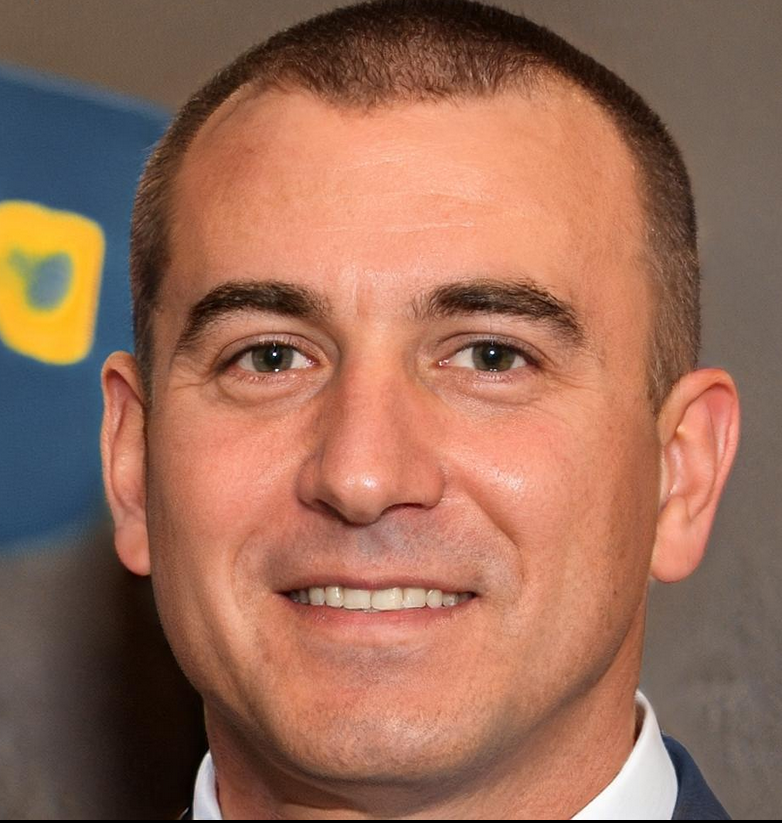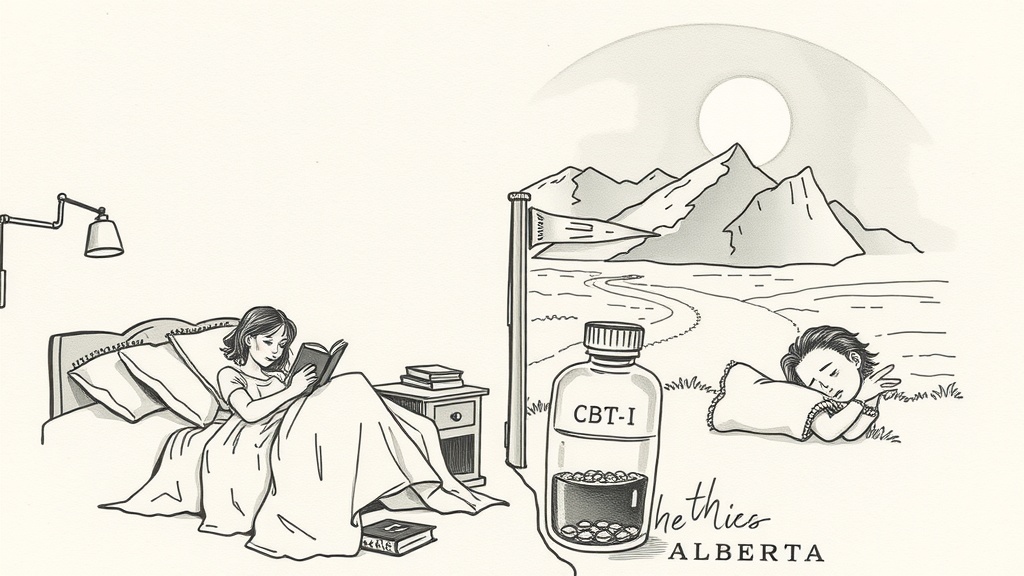· Don Schmidt · Guides · 10 min read
Navigating the Alberta Health System for Insomnia: Public vs. Private CBT-I Options
Explore public and private CBT-I options for insomnia in Alberta. Understand costs, wait times, and access to effective sleep therapy in AB.

Understanding Insomnia and the Role of CBT-I
Insomnia is more than just a restless night; it’s a persistent sleep disorder that can significantly impair daily functioning, affecting mood, energy levels, and overall health. Millions of Canadians, including many Albertans, grapple with this pervasive issue. While various remedies exist, Cognitive Behavioral Therapy for Insomnia (CBT-I) stands out as the gold standard, non-pharmacological treatment. It’s an evidence-based approach that targets the thoughts, feelings, and behaviors contributing to sleep difficulties.
CBT-I is not merely about relaxation techniques; it’s a structured program that helps individuals identify and change the core beliefs and habits that perpetuate insomnia. This includes sleep restriction, stimulus control, cognitive restructuring, and sleep hygiene education. Unlike sleeping pills, which offer temporary relief and can have side effects, CBT-I provides lasting solutions by addressing the root causes of sleep problems. For a deeper dive into how this powerful sleep therapy works, you can explore our detailed guide on How Does CBT-I Work? Understanding This Powerful Sleep Therapy.
The Alberta Health System and Insomnia Care
Alberta boasts a comprehensive healthcare system, but navigating its services for specialized conditions like insomnia can sometimes feel complex. While general practitioners are often the first point of contact, accessing specialized care, particularly for CBT-I, involves understanding referral pathways, wait times, and the distinction between publicly funded and private services.
Public Options for CBT-I in Alberta
For many Albertans, accessing healthcare through the public system is the primary route. While dedicated CBT-I clinics are not as widespread as general physician offices, several avenues exist within the publicly funded system:
1. Physician Referral to Specialized Sleep Clinics or Mental Health Services
Your journey typically begins with your family doctor. If you’re struggling with chronic insomnia, your GP can assess your condition and rule out other underlying medical issues. From there, they may refer you to a specialized sleep clinic or a mental health service within Alberta Health Services (AHS). These clinics often have multidisciplinary teams, including sleep specialists, psychiatrists, and psychologists, who may offer CBT-I.
- Referral Process: Your GP sends a referral to the appropriate AHS service. This referral includes your medical history, symptoms, and the need for specialized sleep support.
- Wait Times: Be prepared for potential wait times. Due to high demand for specialized services, it can take several weeks or even months to get an initial appointment, depending on the clinic and your specific needs. Publicly funded mental health services, while excellent, often operate with longer queues.
2. Group CBT-I Programs
Some AHS zones and primary care networks (PCNs) offer group CBT-I programs. These are often led by psychologists, social workers, or other trained healthcare professionals. Group therapy can be highly effective, providing a supportive environment where individuals learn CBT-I principles alongside others facing similar challenges. These programs are generally covered by Alberta Health Care.
- Accessibility: Availability varies by region. Check with your local PCN or AHS mental health services for information on current offerings.
- Benefits: Group settings can foster a sense of community, reduce feelings of isolation, and provide diverse perspectives on managing insomnia. They are often more readily available than individual public therapy sessions.
3. Online Public Programs and Resources
Alberta Health Services and other public health initiatives have been increasingly leveraging digital platforms to deliver care. While not always a full, one-on-one CBT-I program, these resources can be invaluable starting points.
- Examples: Some PCNs or AHS initiatives may offer online psychoeducational modules or guided self-help programs for sleep. These might be part of broader mental wellness platforms. While not a direct replacement for personalized therapy, they can provide foundational knowledge and initial strategies. For those wondering about the efficacy of digital sleep therapy, our article Is Online CBT-I Effective? A Comprehensive Review of Digital Sleep Therapy in Alberta offers a comprehensive review.
- Limitations: These are often self-directed or minimally guided and may not be suitable for severe or complex cases of insomnia.
Private Options for CBT-I in Alberta
For those seeking more immediate access, specialized care, or a different therapeutic environment, the private sector offers numerous options for CBT-I. These services are typically paid for out-of-pocket or through private insurance.
1. Private Psychologists and Therapists
Many registered psychologists, clinical social workers, and other mental health professionals in Alberta offer CBT-I as part of their private practice. These practitioners have specialized training in sleep disorders and can provide individualized, one-on-one therapy.
- Finding a Private Therapist: You can search directories provided by the College of Alberta Psychologists, the Alberta College of Social Workers, or online platforms specializing in mental health services. Look for therapists with specific training and experience in CBT-I.
- No Referral Needed: In most cases, you do not need a physician’s referral to see a private psychologist, allowing for direct and quicker access to care.
2. Specialized Private Sleep Clinics
Some private clinics specialize solely in sleep disorders, offering comprehensive diagnostic services alongside therapeutic interventions like CBT-I. These clinics may provide a more integrated approach, especially if your insomnia is complex or linked to other sleep conditions like sleep apnea.
- Integrated Care: These clinics can offer polysomnography (sleep studies) and often have a team of specialists, including sleep physicians, psychologists, and respiratory therapists.
3. Online Private CBT-I Platforms
Beyond in-person sessions, numerous private online CBT-I programs and platforms have emerged, offering flexible and accessible options. These can range from fully automated self-help modules to live video sessions with a therapist.

- Convenience: Online options remove geographical barriers, making it easier for Albertans in rural areas or those with mobility issues to access expert care. They also offer scheduling flexibility.
- Cost vs. Access: While still a private expense, online programs can sometimes be more cost-effective than traditional in-person therapy, though this varies widely.
Cost Considerations in Private Care
Private CBT-I sessions can range from $180 to $250+ per hour for a registered psychologist or clinical social worker. A typical CBT-I program usually involves 4-8 sessions, though this can vary based on individual needs. While these costs can be significant, several avenues can help offset them:
- Employer Benefits: Many employer-sponsored health benefits plans include coverage for psychological services. Check your extended health benefits package for details on coverage limits and eligible providers.
- Health Spending Accounts (HSAs): If you have an HSA, you can typically use these funds to cover the cost of private therapy.
- Tax Credits: Psychological services are generally considered medical expenses and may be eligible for the medical expense tax credit on your income tax return.
Making Your Decision: Public vs. Private
The choice between public and private CBT-I options in Alberta largely depends on your individual circumstances, priorities, and resources.
Weighing the Pros and Cons
- Public System Pros: Cost-effective (covered by AHC), potentially integrated with broader AHS services, group therapy options provide community support.
- Public System Cons: Longer wait times, less flexibility in choosing your specific therapist, availability can vary by region, potentially less intensive individual support.
- Private System Pros: Quicker access, choice of therapist, individualized and tailored treatment plans, greater scheduling flexibility, often includes online options.
- Private System Cons: Significant out-of-pocket cost (unless covered by insurance), requires proactive search for a suitable therapist.
Specific Scenarios to Consider
- Urgency: If your insomnia is severely impacting your daily life and you need immediate intervention, a private option might be preferable due to shorter wait times.
- Financial Constraints: If cost is a major barrier and you can manage potential wait times, the public system is the most affordable route.
- Complex Needs: For those with co-occurring mental health conditions or complex sleep disorders, a private psychologist specializing in these areas or an integrated private sleep clinic might offer more comprehensive care.
- Lifestyle: For shift workers, such as many in Alberta’s oil and gas industry, finding a flexible CBT-I program that accommodates irregular schedules might be easier through private online services or a therapist with specific expertise, as detailed in our guide, A CBT-I Guide for Shift Workers in Alberta’s Oil and Gas Industry.
Beyond just access, considering the type of therapy is crucial. For some, CBT-I vs. Sleeping Pills: An Alberta-Focused Guide to Making the Right Choice for Insomnia can help in understanding the long-term benefits of behavioural therapy over medication.
Navigating Challenges and Maximizing Your Care
Regardless of whether you choose the public or private route, being an active participant in your care is key to success. Here are some tips:

- Advocate for Yourself: Don’t hesitate to follow up on referrals in the public system or ask detailed questions when vetting private therapists.
- Prepare for Appointments: Keep a sleep diary, note down your questions, and be open and honest with your healthcare provider about your sleep patterns and struggles.
- Be Persistent: Insomnia treatment takes time and commitment. Stick with the program, even if progress feels slow at first.
- Leverage All Resources: Explore online resources, books, and apps that complement your therapy. Some strategies, like those for managing sleep during Alberta’s long summer days, can be found in resources like Surviving the Midnight Sun: Mastering Sleep with CBT-I in Alberta’s Long Summer Days.
Conclusion
Insomnia is a treatable condition, and effective help is available within Alberta. Whether you navigate the publicly funded system or opt for private care, CBT-I offers a proven path to lasting sleep improvement. By understanding the options, considering your personal circumstances, and proactively seeking the right support, you can embark on your journey towards restful nights and improved well-being. The key is to take that first step and explore what works best for you in the context of the Alberta Health System.
Frequently Asked Questions (FAQ)
Q1: Is CBT-I covered by Alberta Health Care (AHC)?
A1: Generally, direct, one-on-one CBT-I sessions with a psychologist in a private practice are not fully covered by AHC. However, some publicly funded group CBT-I programs or specialized sleep clinics within Alberta Health Services (AHS) may be covered if you receive a referral from your physician. It’s best to confirm coverage with the specific clinic or service.
Q2: How long does it typically take to see a CBT-I specialist in Alberta?
A2: Wait times vary significantly. In the public system, it can range from several weeks to many months, depending on the demand for specialized services in your region. In the private system, you can often get an appointment within a few days to a couple of weeks, though this depends on the therapist’s availability.
Q3: Can my family doctor provide CBT-I?
A3: While your family doctor can diagnose insomnia and offer initial advice or referrals, they typically do not provide full CBT-I programs themselves. CBT-I is a specialized therapy usually delivered by psychologists, psychiatrists, or other trained mental health professionals.
Q4: Are there virtual or online CBT-I options available in Alberta?
A4: Yes, both publicly funded initiatives and private practices offer virtual or online CBT-I options. Some AHS programs or PCNs may provide online modules or group sessions, while many private psychologists and specialized platforms offer tele-CBT-I, allowing you to access therapy from anywhere in the province.
Q5: What’s the main benefit of choosing private CBT-I over public options?
A5: The primary benefits of private CBT-I often include significantly shorter wait times, the ability to choose your specific therapist, more individualized one-on-one attention, and greater flexibility in scheduling. This can be crucial for individuals needing faster access to specialized care.
Assess Your Sleep Quality Today
Take our My Sleep Health Score assessment to get personalized insights about your sleep patterns and discover how CBT-I can help you achieve better sleep.

Don Schmidt
15+ years of experience in sleep therapy and Cognitive Behavioral Therapy for Insomnia (CBT-I). Passionate about connecting individuals struggling with sleep disorders to evidence-based, non-medical treatment solutions. Author of hundreds of articles and comprehensive guides on sleep health, CBT-I techniques, and overcoming insomnia. When not helping clients achieve better sleep, you can find me hiking with my family and dogs or enjoying a good book.
Ready to connect with a provider?
Allow us to connect you with a provider who can help.



